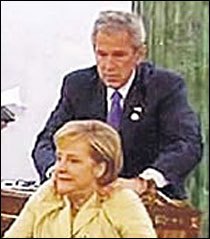massage51 jpg
(14.08 KB, 210x239)
lataus jpg
(9.91 KB, 179x282)
http://libertyherald.co.kr/article/print.php?&bbs_id=libertyherald_news&page=&doc_num=459
https://www.courthousenews.com/wp-content/uploads/2019/08/Giuffre-unseal.pdf
https://en.wikipedia.org/wiki/European_Union
"During the centuries following the fall of Rome in 476, several European states viewed themselves as translatio imperii ("transfer of rule") of the defunct Roman Empire: the Frankish Empire (481–843) and the Holy Roman Empire (962–1806) were thereby attempts to resurrect Rome in the West.[f] This political philosophy of a supra-national rule over the continent, similar to the example of the ancient Roman Empire, resulted in the early Middle Ages in the concept of a renovatio imperii ("restoration of the empire"),either in the forms of the Reichsidee ("imperial idea") or the religiously inspired Imperium Christianum ("christian empire").Medieval Christendom and the political power of the Papacy are often cited as conducive to European integration and unity."
"Pan-European political thought truly emerged during the 19th century, inspired by the liberal ideas of the French and American Revolutions after the demise of Napoléon's Empire (1804–15). In the decades following the outcomes of the Congress of Vienna, ideals of European unity flourished across the continent, especially in the writings of Wojciech Jastrzębowski,[35] Giuseppe Mazzini or Theodore de Korwin Szymanowski. The term United States of Europe (French: États-Unis d'Europe) was used at that time by Victor Hugo during a speech at the International Peace Congress held in Paris in 1849:
A day will come when all nations on our continent will form a European brotherhood ... A day will come when we shall see ... the United States of America and the United States of Europe face to face, reaching out for each other across the seas."
https://en.wikipedia.org/wiki/Ursula_von_der_Leyen
https://en.wikipedia.org/wiki/Von_der_Leyen_(family_from_Krefeld)
"The family was among the hübsche ("courtly" or "genteel") families of Hanover, the informal third elite group after the nobility and the clergy that encompassed the higher bourgeoisie and university-educated civil servants."
https://en.wikipedia.org/wiki/Albrecht_family Ursula von der Leyen is also connected to this line "The Ladson were large plantation owners and wealthy merchants in Charleston, and owned hundreds of slaves until slavery was abolished in 1865. "
https://en.wikipedia.org/wiki/Ladson_family
https://en.wikipedia.org/wiki/Angela_Merkel
https://hungarytoday.hu/orban-merkel-anniversary-pan-european-picnic/
https://en.wikipedia.org/wiki/Pan-European_Picnic
"The idea of opening the border at a ceremony came from Otto von Habsburg and was brought up by him to Miklós Németh, the then Hungarian Prime Minister, who promoted the idea."
